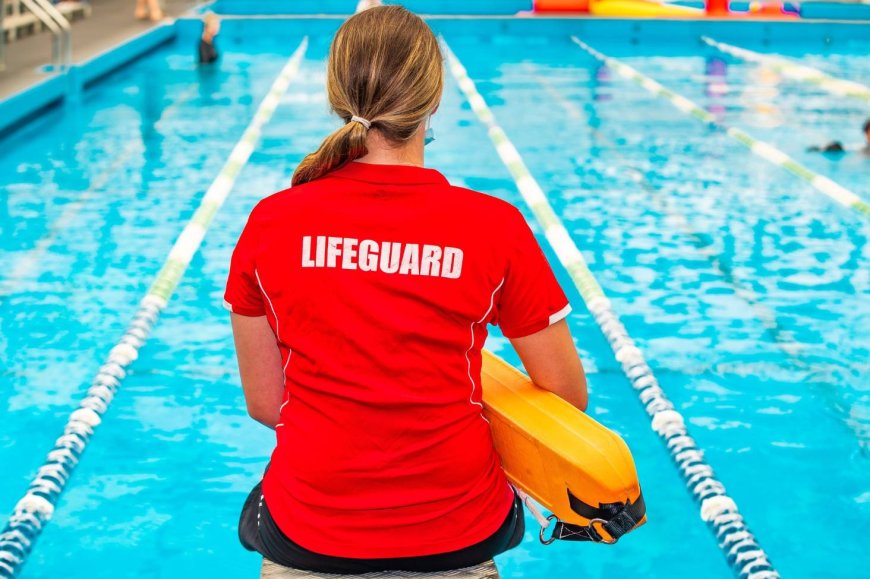How to Find Lifeguard Courses Near Me in 2025: A Complete Guide
Whether you're a student looking for a summer job or someone ready to turn this into a full-time profession, this guide will show you how to find lifeguard courses near me, obtain certification, discover job opportunities, and build a career out of saving lives.

Are you passionate about water safety, love spending time at the pool or beach, and looking for a career that combines purpose and action? Becoming a certified lifeguard might be your ideal path. In 2025, the demand for trained lifeguards continues to grow across the United States, making it an excellent time to begin your journey.
Whether you're a student looking for a summer job or someone ready to turn this into a full-time profession, this guide will show you how to find lifeguard courses near me, obtain certification, discover job opportunities, and build a career out of saving lives.
Why Lifeguarding is a Dream Job for Many
Lifeguarding offers more than just a paycheck. It provides you with the opportunity to:
-
Save lives and promote safety
-
Work in dynamic and outdoor environments
-
Stay physically active
-
Gain leadership and emergency response skills
-
Open doors to careers in fitness, emergency services, or healthcare
Many people start as seasonal lifeguards and evolve into full-time professionals, beach managers, or aquatics instructors. If water is your element, this could be your dream job!
How to Find Lifeguard Courses Near Me in 2025
1. Search Online Using Local Keywords
Start with a simple online search using phrases like:
-
“Lifeguard courses near me 2025”
-
“Lifeguard certification near [your city or zip code]”
-
“Best lifeguard training centers in [state]”
You’ll find listings from local community pools, aquatic centers, and nationally recognized programs.
2. Visit American Lifeguard Association or American Lifeguard USA
National organizations like the American Lifeguard Association (ALA) and American Lifeguard USA offer directories of certified training centers. They provide both in-person and blended online options. You can filter courses by state, course type, and availability.
These platforms also offer valuable insights on:
-
Certification requirements
-
Course durations
-
Recertification options
-
Job assistance services
Call or check their websites for the latest schedules and sign-up requirements.
3. Inquire at Pools, Beaches, and Resorts
Sometimes, aquatic facilities hire and then sponsor your training. If you have a specific workplace in mind—a beach club, hotel, or waterpark—reach out directly to ask if they offer or recommend certification programs.
What to Expect in a Lifeguard Course
Most lifeguard certification courses include:
-
CPR (Cardiopulmonary Resuscitation)
-
First Aid and AED training
-
Water rescue techniques
-
Spinal injury management
-
Surveillance skills and emergency protocols
Courses typically range from 25–35 hours and include both theoretical instruction and practical in-water training. At the end of the course, you must pass a skills test and written exam to earn your certification.
Certification: Your Gateway to Employment
Once certified, you’ll receive a nationally recognized lifeguard certification card valid for two years. This qualifies you to apply for lifeguard positions at:
-
Pools
-
Beaches
-
Hotels and resorts
-
Waterparks
-
Cruise ships
-
Summer camps
-
Fitness centers
Some facilities may also require or recommend additional certifications like Waterfront Lifeguarding or Shallow Water Lifeguarding, depending on their environment.
Job Opportunities in 2025
With the continued expansion of recreational facilities and heightened safety standards, certified lifeguards are in high demand.
Top job opportunities in 2025 include:
-
Resort Lifeguards: High-end hotels and vacation destinations are always hiring for seasonal or year-round roles.
-
Municipal Pools and Parks: Local governments frequently recruit lifeguards for public pools and beaches.
-
Youth Camps: Lifeguards play a key role in summer camps across the country.
-
Aquatic Therapy Centers: Work in healthcare settings supporting physical rehab and therapy sessions.
Some employers offer additional perks such as bonuses, housing (for seasonal beach positions), or scholarships for students.
Best Places to Take Lifeguard Courses in 2025
Here are some of the best and most trusted places to get certified:
1. American Lifeguard Association
Offers in-depth training and flexible schedules, including blended courses (online + in-person). Recognized nationwide.
2. American Lifeguard USA
Known for quality instruction, a wide network of training partners, and job placement assistance.
4. Local Colleges and Universities
Some institutions offer lifeguard certification through their recreation or kinesiology departments.
5. Private Aquatic Centers
Look for swim schools or aquatic clubs that offer year-round lifeguard training in your area.
Tips for Success
To maximize your experience, follow these tips:
-
Start early: Classes can fill quickly, especially before summer.
-
Stay fit: Swimming and endurance are crucial. Practice laps before class.
-
Take it seriously: This is a life-saving role, and your focus matters.
-
Renew certifications: Stay current and consider adding specialties like instructor training or water safety education.
Turning Lifeguarding into a Long-Term Career
Lifeguarding can lead to careers in:
-
Aquatics management
-
Coaching or swim instruction
-
EMS or firefighting
-
Public safety and health education
-
Scuba diving or marine rescue
Many begin as part-time guards and grow into leadership positions over time. With the right training and commitment, lifeguarding can evolve into a fulfilling career.
Conclusion
Finding lifeguard courses near you in 2025 is easier than ever thanks to nationwide certification programs, digital resources, and growing opportunities in aquatic safety. With the proper training, you can not only become certified but also land rewarding jobs that allow you to make a real difference. Lifeguarding is more than a job—it’s a calling. Start your journey today and take the first step toward making water safer for everyone.








































































![https //g.co/recover for help [1-866-719-1006]](https://newsquo.com/uploads/images/202506/image_430x256_684949454da3e.jpg)



























![[PATREON EXCLUSIVE] The Power of No: How to Say It, Mean It, and Lead with It](https://tpgblog.com/wp-content/uploads/2025/06/just-say-no.jpg?#)



















































